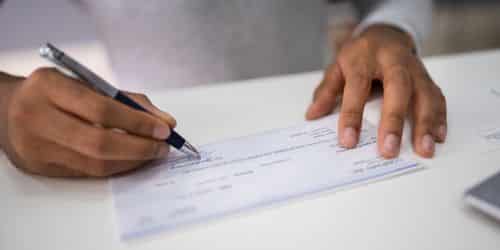Checks are not designed to be kept for an extended period of time. It is the courteous and proper thing to do to deposit or cash a check as soon as possible. This is because the person who gave you the cheque may feel uneasy or apprehensive if it goes uncashed. If you cash or deposit the check, the writer will know you have received the money. Regardless, many financial institutions have time limits on how long they will accept a signed check for deposit. Life gets hectic, you lost, misplaced, and forget about a check and suddenly you have an old check and don’t know what to do with it. Hence, if you don’t want your check rejected by the bank, you need to know the exact date it will be valid for. So, how long is a check good for?
How Long Is a Check Good For?
The Uniform Commercial Code states that checks have a six-month validity period. Financial companies are generally not required to honor your previous cheque after six months have gone by. This financial institution policy promotes consistency in financial transactions between institutions and states.
In addition, compliance with general check-cashing rules benefits both customers and banking institutions. It also makes it easier for everyone to complete their financial transactions knowing what to anticipate.
Fortunately, this general rule of thumb does not imply that a bank or credit union will not accept checks that is more than six months old. This simply implies that it is up to the individual bank to decide whether or not to honor the older checks.
A bank is more likely to cash an old check if it has reasonable assurance that the funds are still available. This can generally be ascertained by looking into your history with the bank or the identity of the check’s creator.
How long you have to deposit a check depends on a number of factors, including who issued the check to you, what kind of check it is, and where you are seeking to deposit it.
How Long are Various Kinds of Check Good For?
Checks generally come with a variety of expiration dates. Although the 6-month rule is generally true, there are exceptions, such as with some forms of money orders and checks.
How Long are Personal Checks Good For?
Payroll, corporate, and personal checks expire after six months (180 days). Some companies pre-print “void after 90 days” on their checks. The pre-printed phrase is intended to urge individuals to deposit or cash a check as soon as possible even though the majority of institutions will honor those checks for up to 180 days.
Basically, it’s important to cash or deposit a check you’ve received as soon as you can. If you keep a check around for a while, there’s a chance the account number or routing number will change, or the person who wrote the check might have lost track of it and used the money for something else. In addition, it’s possible that this will result in you having to pay a fee for a returned check.
How Long is Business Check Good For?
Business checks are distinct from personal checks. Typically, a person writes a personal check, frequently for another person. Business checks can also be checks that an individual has written for a corporation, although they are often checks that a firm has written.
Most business checks will be linked to the checking account of the company. These checks may be used by a company to pay suppliers or staff. These checks is often programmed to expire after 90 to 180 days.
How Long are the U.S. the Treasury Checks Good for?
In accordance with federal law, U.S. Treasury checks are generally valid for a full calendar year from the date they were issued. Also, since the federal government is the one issuing tax refund checks, they are also only valid for a single year. Treasury. Once that period has passed, you can still claim the money the government owes you. However, you will need to request a new check from the check’s issuer.
How long are Local and State Government Checks Valid?
Local and state government checks have a shelf life that must be adhered to. Accordingly, the validity period for a state tax refund check might range from six months to a year, depending on the state. Hence, get in touch with the state if your tax refund check has expired so that you can order a fresh one. You still have a right to receive the money the government owes you, just like with federal checks.
When you get a cheque from the government, examine it carefully and look for anything that indicates the expiration date. The best course of action is basically to deposit or cash the check before it expires.
How Long Do Cashier’s Checks Long for?
Cashier’s checks are a form of “official check” and the procedures around them can be intricate. Cashier’s checks do not have a definite or predetermined expiration date. While some argue cashier’s checks don’t expire, others claim a cashier’s check is stale (out of date) after 60, 90, or 180 days. Though cashier’s checks are generally valid for as long as the issuing bank is in business, some financial institutions place their own expiration dates on the checks.
Expired cashier’s checks, or one that has been lost or stolen, can be a hassle to cash or replacement. So, if you receive a cashier’s check, look for a “void after X days” notice and make sure you cash or deposit the check before then. You should contact the issuing bank and inquire as to what steps you need to take if you come across an old cashier’s check.
How Long Do Money Orders Valid?
Money orders are valid for a period of time determined by the state in which they were issued and the issuer’s policies. While money orders don’t technically expire, they can lose value over time if they’re not used or if they’re so old that they’re considered abandoned under local law.
Hence, you should read the issuer’s terms and conditions carefully. After 1-3 years, Western Union will impose a fee against the value of the money order. And, if this continues for a long time, the money order will nevertheless become useless. USPS money orders never lose value and generally have no expiration date. You can also cash a U.S. Postal Service money order everywhere there are post offices.
Remember that it’s always conceivable that Western Union or the U.S. Postal Service has modified its policies. So, inquire with the money order’s issuer about any fees or time limits associated with unused money.
Money orders are an alternative to using checks and are typically used for transactions of lower value.
How Long is a Traveler’s Check Valid?
Traveler’s checks are still used, even if they’re not as popular as they once were. Traveler’s checks function similarly to ordinary checks, with the exception that they are insured.
This generally gives tourists and visitors to foreign countries more financial security while they are traveling.
Traveler’s checks don’t expire because they function more like cash or prepaid checks. And, no matter where you are at home or abroad you can use them whenever you choose.
What Happens if You Don’t Cash a Check?
What do you think occurs to a personal check if you do not cash or deposit it? Personal checks have a similar six-month expiration as commercial checks (180 days). Although it can be more difficult to remind a company payee to cash a check than a friend or family member, personal cheques that have not been cashed can be a significant drain on your budget.
What Happens if You Deposit an Expired Check?
Even if the bank where you have an account allows you to deposit the check, the issuing bank may still reject it on the grounds that it was written on the wrong date. This could result in a fee being deducted from the amount taken from your account. In addition, there’s a chance that the check won’t clear, but bounce.
Can You Cash an Expired Check?
Banks are not obligated to cash checks older than six months (180 days). This is as declared by the Uniform Commercial Code (UCC), a body of legislation that regulates business transactions, including checks. On the other hand, as long as the financial institution believes the funds are valid, banks are still permitted to handle old checks.
Can I Cash a 2-Year-Old Check?
Theoretically, you can cash a check that is more than two years old, however, the bank is not required by law to handle the transaction.
Your best choice if you have a check that is more than two years old is to discuss it with your bank, the payer, or even the state.
Can I Cash a 2-Year-Old Cheque?
Theoretically, you can cash a check that is more than two years old, but the bank is not required by law to handle the transaction.
Your best choice if you have a check that is more than two years old is to discuss it with your bank, the payer, or even the state.
Can I Cash a Check From 5 Years Ago?
Generally, banks are not obligated to cash checks older than six months (180 days). This is basically stipulated by the UCC or the Uniform Commercial Code. The UCC is a body of law that regulates commercial transactions like checks.
Can You Deposit a 4-Year-Old Cheque?
The UCC, or Uniform Commercial Code, is a body of law that aims to standardize sales law and related rules across the United States. Banks are not required by the UCC to honor personal or commercial cheques that are more than 180 days past their due date (6 months).
Does the Date on a Check Matter?
A signed check is immediately considered lawful currency and can be cashed or deposited by a bank prior to the check’s stated expiration date. Hence, if a check is dated and signed, a bank will be able to accept it.
Conclusion
Checks are financial instruments without a set expiration date, hence they typically do not have an expiration date. Personal checks do, however, lose their “freshness” after a specific period of time, typically six months.
Legally, banks are not obligated to deposit or cash expired checks. However, checks expiring and being stale are not nearly the same thing. Stale checks are generally subject to acceptance or rejection by the cashing institution depending on the bank’s sole discretion.
FAQs
What is the expiry date for a check written by you?
You can anticipate a check you’ve written to someone else to last about six months. The beneficiary may not be able to if they don’t cash or deposit the check within six months of your authorization. So, consider the money lost unless you learn otherwise because there’s still a chance the bank will handle the payment.
Can I alter the check's date?
Checks’ dates cannot be changed, to put it succinctly. Most banks and other financial institutions know about your business’s worries and needs and have heard this request many times before. An eCheck is time- and date-stamped as a security measure. This date and time stamp make it impossible to change the date on checks.
Related Articles
- What is a Cashier’s Check? Where & How to Get One
- Cashier’s Check vs Money Order: Which is Best?
- WHAT IS A CERTIFIED BANK CHECK: How to Get One
- CASHIER’S CHECK SCAMS: How to Identify a Fake Cashier Check






